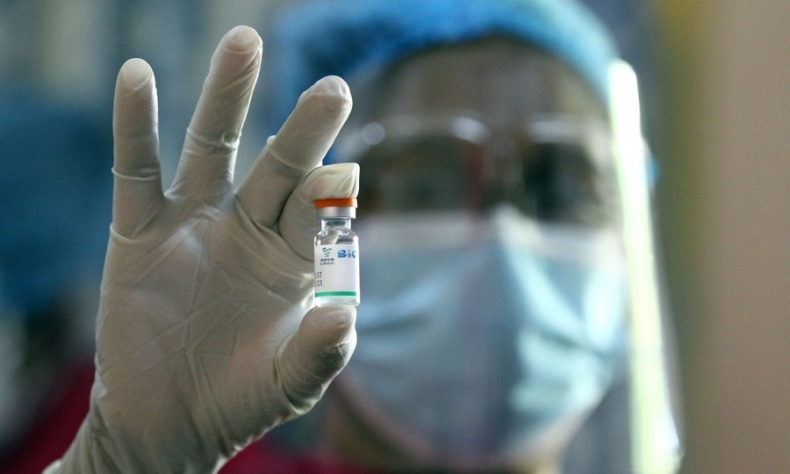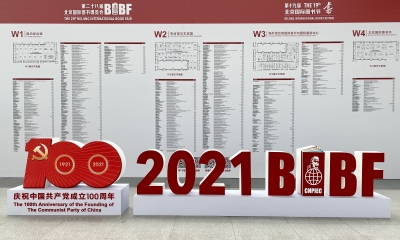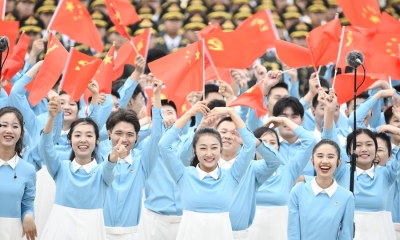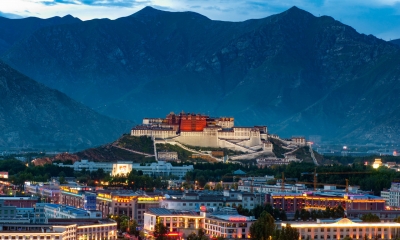Covid Vaccine Patent Protection Debate: Not the Time for Ideological Squabbling

With the rise of a deadly new variant, the world stands at a historic crossroads. We cannot afford any more leadership failures.
When Washington announced its support to waive intellectual property protocols for Covid19 vaccines, it sparked a highly charged row.
Critics, led by the pharmaceutical industry, claimed that removing intellectual property (IP) would sow confusion between the public-private partnership and undermine future innovation. Their argument, in a nutshell, is that IP protocols protect the profit motive; without which, the industry would suffer and development would grind to a halt. Responding to the US decision, German Chancellor Angela Merkel made this very argument. “The protection of intellectual property is a source of innovation and it must remain so in the future,” she said.
On the other side of the debate, head of the World Health Organization Dr. Tedros Adhanom Ghebreyesus hailed Washington’s decision as a “monumental moment in the fight against Covid19”. Meanwhile, the head of the World Trade Organization Ngozi Okonjo-Iweala urged members to start negotiations as soon as possible. “The world is watching and people are dying,” she added.
Vaccines as global public goods
At the center of the ongoing row remains a question over whether Covid vaccines should be treated as a commercial product or as global public goods.
The idea of vaccines as global public goods began to receive attention following the 73rd World Health Assembly last year. During the summit, several world leaders including Chinese President Xi Jinping, called for future coronavirus vaccines to be treated as a global public good. Soon after, the World Health Organization launched the Covid-19 Technology Access Pool (C-TAP). Issuing an urgent “Solidarity Call to Action”, the WHO called on pharmaceutical companies to pool their knowledge, intellectual property, and data in order to realize equitable global access to vaccines. One year later and C-TAP has gone largely unused as vaccine makers have refused to share their knowledge.
Wealthy countries, able to take on the risks of purchasing undeveloped products, bought-up almost the entire supply of Covid vaccines. In some cases, countries secured enough shots to vaccinate their citizens many times over. Poorer nations meanwhile struggled to secure doses for even their frontline healthcare workers.
“There remains a shocking imbalance in the global distribution of vaccines,” WHO chief Dr. Tedros told a news conference last month. “On average in high-income countries, almost one in four people have received a Covid-19 vaccine. In low-income countries, it’s one in more than 500,” he added.
Currently, only 1 percent of coronavirus vaccines are going to low-income countries, and projections show much of the world’s population may not be vaccinated until 2024. South African President Cyril Ramaphosa warned recently that if wealthy nations continue to snap up Covid19 shots while people in poor countries died waiting for them, it would amount to “vaccine apartheid”.
Given the severity of this situation, the United Nations issued an urgent call for Covid vaccines to become a global public good. Announcing the launch of “Only Together”– a global campaign dedicated to advancing fair and equitable access to Covid vaccines — Secretary-General António Guterres said, “Only together can we end this pandemic and recover.”
More than 360 NGOs and global health groups have since joined the call for pharmaceutical companies to share their vaccine know-how with the world. But, as voices in support of an IP waiver have grown, so too have the objections of critics.
Vaccines as private cash cows
In the United States, the pharmaceutical industry dispatched an army of lobbyists to rally against the waiver. During the first three months of this year, the industry reportedly spent a record-breaking $92 million lobbying the federal government. The Pharmaceutical Research and Manufacturers of America (PhRMA), whose members include AstraZeneca, Pfizer, and Johnson & Johnson, plowed $8.7 million into the lobbying effort.
In the grand scheme of things, such figures are small change when compared to the revenues generated by an industry with a stranglehold over one of the world’s most desperately needed commodities. Pfizer, for example, reported $3.5 billion in revenue from sales of their vaccine in just the first three months of this year alone.
Corporate insiders and those on the pharmaceutical payroll have made a string of claims as to why sharing Covid vaccine technology would be a bad idea.
First, they invoked the sacrosanctity of intellectual property. Critics claimed that any change to the TRIPS framework would significantly damage the pharmaceutical industry and undermine future innovation. Amid a surge in new coronavirus cases and a growing vaccine gulf between rich and poor nations, the narrative shifted somewhat.
Lobbyists now argue that sharing Covid vaccine technology will not actually lead to an increased vaccine supply. The ongoing bottleneck, they say, is not because of limited access to the technology; instead, it is the result of a scarcity of raw materials. According to this view, waving patent protections would set off a worldwide race for raw materials, and would therefore do “more harm than good”.
“Currently, infrastructure is not the bottleneck for us manufacturing faster,” Pfizer CEO Alber Bourla wrote on LinkedIn. “The restriction is the scarcity of highly specialized raw materials needed to produce our vaccine.”
Some in the US have attempted to frame the debate through the lens of big-power rivalry. In the weeks leading up to Washington’s decision, the Financial Times reported that vaccine makers lobbied officials against supporting the waiver as it would “risk handing novel technology to China and Russia”. The narrative has since been amplified by a small faction of the GOP who are now calling on the Biden administration to withdraw US support for the waiver.
“Waiving IP protections under this proposal runs counter to long-standing American values,” wrote Republican Senator Steve Daines. “Moreover… [it] provides for a technological windfall for adversaries such as China and Russia” he added.
Solidarity call to action
The landmark proposal, submitted to the WTO by India and South Africa in October, now has the support of more than 120 governments. Efforts to expand vaccine production are being stonewalled by a small number of notably wealthy and well-vaccinated countries. At the last round of virtual WTO talks in April, countries including the US, Canada, the UK, Australia, and the European Union blocked the waiver.
Health campaigners, including Doctors Without Borders (MSF), called on those blocking the waiver to immediately reverse their obstructive tactics. “Countries must stop obstructing and show the leadership required to deliver on the ‘global solidarity’ they have so often declared during this pandemic,” said MSF International President Dr. Christos Christou.
The call for global solidarity comes at a pivotal moment in the fight against Covid19.
In India, which has now become the global epicenter of a deadly new Covid variant, over 400,000 new cases are being identified each day. People are dying in ambulance bays and car parks while awaiting beds and oxygen. Meanwhile, bodies are being dumped in the holy Ganges River as morgues and crematoriums struggle to keep up with demand. A report from The Lancet warned that the country could surpass 1 million COVID deaths by August 1.
The new mutant strain, which notably shows signs of increased transmissibility, was recently declared by the WHO to be a “variant of concern”. As reports of the new variant spreading around the world increase, India’s problem is fast becoming a global problem. The issue remains that the longer the virus is in circulation, the greater the chances are that it will mutate. And with each new mutation, the risk of a new vaccine-resistant strain appearing, steadily increases. This must not be allowed to happen.
According to a devastating new study published last week, the pandemic was entirely “preventable”. The members of the Independent Panel for Pandemic Preparedness and Response found that “failures in leadership” allowed the pandemic to trigger a catastrophic human and socioeconomic crisis.
Leaders must own up to their failures and recognize that they must now do all they can to bring the pandemic to an end as quickly as possible. Stopping the developing world from producing generic versions of the vaccines will not only prolong the pandemic, it could quite literally return the world right back to square one.
This article reflects the views of the author and not necessarily that of China Focus.
 Facebook
Facebook
 Twitter
Twitter
 Linkedin
Linkedin
 Google +
Google +







